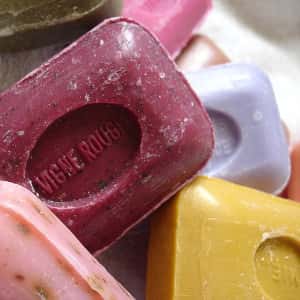
Do you suffer from nerve pain? This type of pain can be quite difficult to treat. Medications such as gabapentin (Neurontin) or pregabalin (Lyrica) may ease the discomfort, especially at first. However, both drugs can trigger adverse reactions that may be very unpleasant. In addition, people sometimes have trouble stopping the medicines. Have you ever tried a peculiar home remedy like soap for neuropathy? It might not work, but it is unlikely to cause harm. One skeptical reader tried it and reported benefit for both the neuropathic pain and for the restless legs syndrome (RLS).
Soap for Neuropathy and RLS:
Q. I have been dealing with neuropathy for years and currently take pregabalin to manage it. However, there are nights when the pain becomes so intense that it wakes me up and lasts for several hours. This significantly disrupts my sleep, which is so precious and essential for physical and mental health.
Your radio show and articles have mentioned using bar soap as an alternative or additional treatment. You’ve suggested that the off-gassing vapors of the soap might positively affect the transient receptor potential. I am curious about this approach and have a few questions:
Are there particular soap brands that people have found more beneficial than others?
Is it correct to assume that the soap should be placed in a mesh bag to allow the vapors to permeate?
Where exactly should the soap be placed in relation to the legs and feet for the best effect?
A. We have written far more often about using soap under the bottom sheet to ward off nocturnal leg cramps than about nerve pain. Your mention of neuropathy sent us to our website, where we discovered an intriguing testimonial from several years ago:
Q. I have RLS and minor neuropathy in my left foot. I was taking ropinirole to treat it.
A lady in my church group suggested soap. I am a “Doubting Thomasina,” so I was skeptical.
However, I bought a pack of lavender soap and a mesh bag to put it in.
I missed the instructions about putting it under the bottom sheet, so I sat here in my recliner with soap between my foot and right leg. I brought the bag to bed with me and slept with it. WOW! I woke up from the best sleep I have gotten in a long time. My neuropathy is much less intense.
I can’t speak for others, but it works for me. A six pack of soap cost $1.97 and a mesh bag at $2 is super affordable.
We don’t know if you will get similar relief, but we are reasonably sure that sleeping with soap in a mesh bag or under the bottom sheet near the legs will not have dangerous side effects. You are correct that we think a compound in the fragrance for soaps like Ivory or Irish Spring may trigger transient receptor potential (TRP) channels and calm hyperactive nerves. Keep reading for a further explanation.
Muscle and Nerve Connections Are Sensitive to Soap Fragrance:
A. Muscle cramps and restless leg syndrome (RLS) are both conditions involving the connections between muscles and nerves. We suspect that the fragrance in many soaps (limonene) stimulates specialized TRP channels. This effect may cause the overactive nerves to relax.
Not everyone will benefit from soap for neuropathy or RLS as much as you did. Nonetheless, many readers have found the soap remedy helpful.
The TRP Channel Explanation:
What, you may wonder, is a TRP channel? TRP stands for transient receptor potential. These are channels in cells that shuttle ions of crucial elements like calcium or potassium where they need to be. Sensory neurons have TRPA1 channels that help them detect harmful substances (Sousa-Valente et al, British Journal of Pharmacology, May 2014). When limonene is applied directly to the skin, it activates the TRPA1 channels and causes pain, but “systemic application” inhibits pain (Kaimoto et al, European Journal of Pain, Aug. 2016). Presumably, keeping the soap close to the leg permits the limonene to act systemically.
Other essential oil components may also have analgesic activity (de Cassia da Silveira et al, International Journal of Molecular Sciences, Dec. 9, 2017). Like limonene, they may well be acting through TRP channels.
Researchers have confirmed that TRP channels are important in the development of neuropathy (Ding et al, Cell Discovery, Aug. 1, 2017). That would help explain the benefit of soap for neuropathy. So far as we can tell, no scientists have investigated whether TRP channels have any impact on RLS.
Bed Soap:
We think that probably any scented soap will work for those who find it helpful. We do, however, have a special product. Our lavender-scented Bed Soap, which is flat to fit easily under the bottom sheet, is back in stock. Many readers have found it helpful for preventing or short-stopping nighttime leg cramps.

